Bahrain Says It Foiled An attack, Seized Iranian Weapons And Explosives
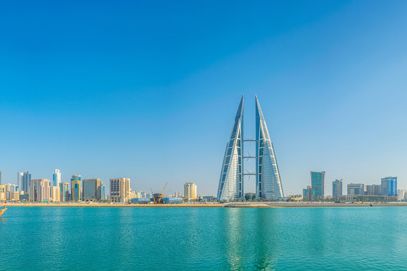
Bahrain arrested several suspected militants ahead of an attack and seized weapons and explosives that had come from Iran, the interior ministry said on Monday.

Bahrain arrested several suspected militants ahead of an attack and seized weapons and explosives that had come from Iran, the interior ministry said on Monday.
The ministry, tweeting the news, did not say how many people were arrested or specify their nationalities. It described them as "linked with terrorist groups in Iran" and said they were "plotting terrorist operations against security and civil peace".
Bahrain, host to the US Navy's Fifth Fleet and other international naval operations, has often accused Shiite Muslim Iran of seeking to subvert the Sunni-ruled kingdom, which has a Shiite majority. Iran has denied such charges.
The island state was the only Gulf Arab state to witness a sizeable pro-democracy uprising in the 2011 "Arab Spring", from a largely Shi'ite opposition movement, which it quashed with help from Saudi Arabia and the United Arab Emirates.
Last year, Bahrain said it had foiled a "terrorist attack" backed by Iran's Islamic Revolutionary Guard Corps.
Iranian officials and government-controlled media routinely attack Bahrain’s royal family and its close ties with Saudi Arabia.
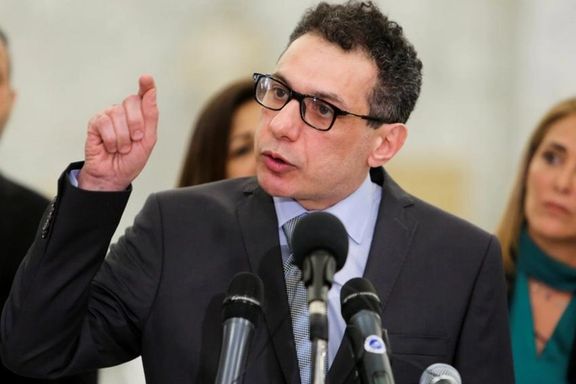
A former foreign detainee in Iran has told Iranian expats not to be tricked by the foreign minister claiming to guarantee their safety if they visit the country.
Nizar Zakka, a Lebanese citizen, and a US permanent resident spent four years in Iranian prisons on vague charges of espionage for the United States and was released in June 2019 after an appeal by Lebanese President Michelle Aoun.
He responded to a statement by Amir-Abdollahian saying that if expat Iranians want to visit the country, the foreign ministry can tell them if they have any legal issues and once cleared, they have nothing to fear about.
Zakka tweeted, “What are the guarantees, and from whom? You? What about foreigners? You were at the foreign ministry when your gov invited and kidnapped me.”
Zakkawas invited to Iran in 2016 by a top official of former president Hassan Rouhani’s government, but once he was arrested and jailed by the Revolutionary Guard the official said there was complete lack of coordination between the government and security forces.
Iran has arrested many dual nationals who have visited the country and used them as bargaining chips against Western countries, according to human rights organizations.
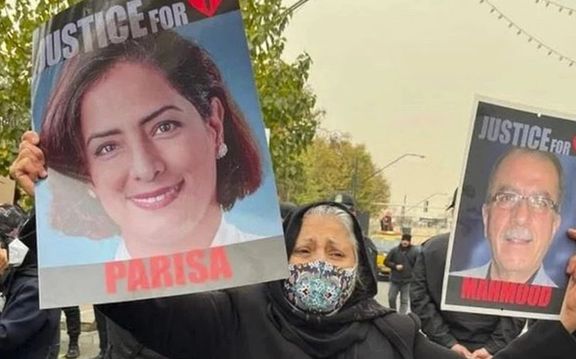
The trial of ten military personnel involved in shooting down a Ukrainian airliner in 2019 began in Tehran Monday with some parents boycotting the proceedings.
Families of some of those killed in Iran’s downing of Ukrainian Airlines Flight PS752 on January 8, 2019 say the trial of those allegedly responsible lacks transparency and due process. "This a shameful show with ten low-ranking officers on trial," said Hamed Esmaeilion, the Canada-based spokesman for some of the families, Sunday.
Abbas Abdi, a reformist politician, in a tweet Monday also criticized the authorities. "Make the trial transparent,” he wrote. “It will be in everyone's interest," he wrote.
The passenger plane was hit by two surface-to-air missiles in the tense aftermath of Iran's missile attack on United States military bases in Iraq in retaliation for the US killing of Iranian general Ghasem Soleimani and nine others in Baghdad. All 176 onboard died.
Among those protesting outside court were family members either barred from attending or refusing to acknowledge the court. Protesters held photos of victims and chanted slogans, while surrounded by police and security forces who kept others away.
Names, ranks, and positions of the suspects were not disclosed. Victims' families and critics say those on trial are not responsible for decisions taken at a higher level on the night of the incident. They say Amir-Ali Hajizadeh, the Revolutionary Guards aerospace commander was responsible because he did not “clear the airspace.”
Hajizadeh commented last week on the tragedy, which Iran attributed to the misalignment of a mobile surface-to-air missile battery at a time of high alert. "How is it possible that a plane so huge cannot return to the airport and land [after being hit] by a few kilos of explosives?" Hajizadeh asked a gathering of Sharif University students November 15.
In response Abolfazl Najafi-Tehrani, a dissident cleric and publisher in Tehran tweetedNovember 17: "It is not too far-fetched that few years from now Hajizadeh and Co. ask there is a question of why the Ukrainian plane placed itself in the path of our missile to cause this incident and to demand the families of the victims and the Ukrainian airliner to pay for the missiles that the plane hit itself against!"
In another reaction reformist politician Mostafa Tajzadeh tweeted: "The nation's question is why you couldn't tell the difference between the Ukrainian passenger flight and an enemy missile [to shoot at it]? Why two [missiles]? Why did you lie to the world for several days?"
The Ukrainian ambassador refused an invitation to attend the trial. Ukrainian journalist Anna Rajskaya tweeted Sunday that the ambassador did not want to legitimize the trial given the Ukrainian deputy justice minister had said Iran’s investigation was inadequate.
A date for the next session has not been announced.
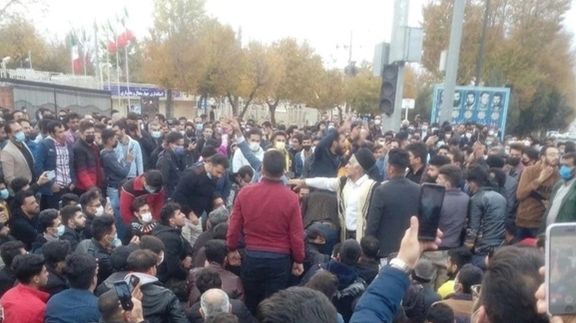
Protests over water shortage continued in Iran’s Shahre Kord city on Monday, with people demanding the region’s water rights after similar protests in Esfahan.
The Monday protests followed a noisy demonstration on Sunday where a call was made to gather again and continue demands for the water rights of Chahar Mahal and Bakhtiari province, a mountainous region in the Zagros mountains.
What apparently triggered the protests in Share Kord, the provincial center, was a huge protest on November 19 in neighboring city of Esfahan in central Iran, where tens of thousands gathered to demand water from the government. The city’s iconic Zayandeh Roud river has been completely dry for a decade and residents blame government mismanagement in diverting water to ill-conceived industrial projects.
But residents of neighboring mountainous regions are concerned that the government will divert more water to Esfahan, reducing what is available for their irrigation needs.
The people of Shahre-Kord region are known as fiercely independent heirs to once warrior mountain tribes and videos on social media show their anger during the protest on Monday. In one such clip protesters are shouting a warning that the authorities should fear the day when they take up arms.
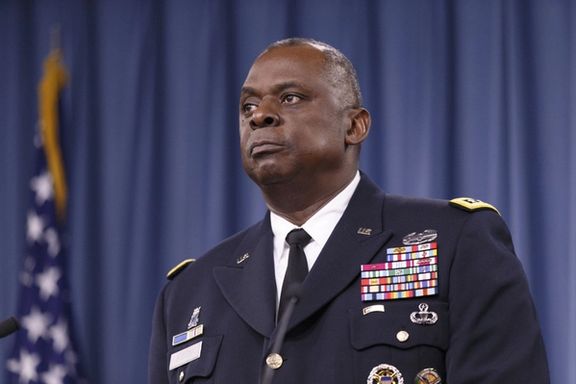
US Secretary of Defense Lloyd Austin ended his Middle East trip on Monday emphasizing the importance of reassuring regional allies about America's commitments.
Austin’s last meeting was with Abu Dhab’s Crown Prince Mohammed Bin Zayed Al Nahyan during which the Defense Secretary reaffirmed “the importance of the US-UAE strategic partnership.” He also thanked the United Arab Emirates for hosting US troops.
The Secretary who attended the Manama Dialogue conference in Bahrain had a series of meetings with regional partners. During the conference he talked about Iran and tried to reassure regional alliesabout the Biden Administration’s determination not to allow Iran to acquire nuclear weapons.
Israel and America’s Arab allies are concerned about Iran’s growing nuclear program and its belligerent regional policies, while the United States continues to rely on diplomacy to reach a nuclear agreement with Tehran.
In a tweet at the end of his visit Austin said, “One of my core missions as SecDef is to deepen our partnerships. I want our partners to know they are important to us and that they will see a commitment from us for years to come.”
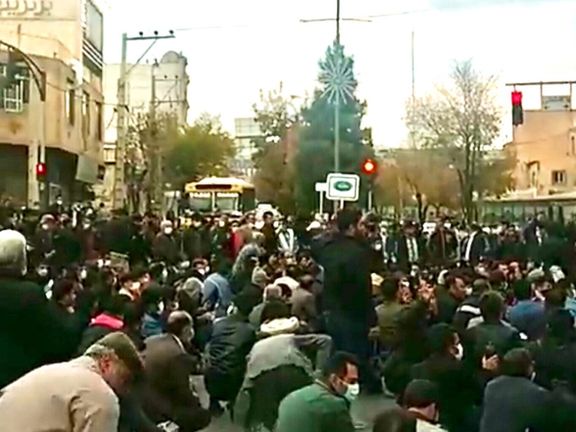
Promises by the government to deliver water to Iran’s Esfahan Province amid protests are fueling regional tensions between the wealthy region and its neighbors.
After a massive water protest Friday in the city of Esfahan, the capital of the province, its representatives in the parliament have demanded acceleration of government projects for transferring water from the neighboring province of Chahar Mahal and Bakhtiari.
Farmers in Esfahan Province have been protesting shortage of water for nearly two weeks now. On Friday thousands of residents of the provincial capital joined the farmers who have pitched tents in the dry bed of the city's Zayandeh Roud.
Authorities who blame this year's drought for the exacerbation of water shortage have kept promising to take action to resolve the long-standing problem and to compensate the farmers who have not been able to sow autumn crops.
The promises have not only failed to send the farmers and their supporters home, but have also given rise to dissatisfaction and protests elsewhere, namely the neighboring Chahar Mahal and Bakhtiari Province from where water should be diverted to Esfahan.
Videos posted on social media Sunday showed hundreds of people in the largely agricultural and less-developed Chahar Mahal and Bakhtiari marching Sunday in front of the Governor's Office in the provincial capital, Shahr-e Kord.
"No Water Can Be Taken from Chahar Mahal," protesters chanted in Shahr-e Kord and demanded the governor to respond to their calls. Protesters who have vowed to return Monday to continue their protest also chanted slogans against "cowardly authorities" and called on the people of neighboring Lorestan and Khuzestan provinces to support their cause.
The protest rally in Esfahan on Friday and Shahr-e Kord on Sunday are quite unique. This time, unlike any previous protests such as water crisis protests in Khuzestan in July, security forces did not visibly interfere and try to disperse the massive crowds. Also, for the very first time, the local state-run channels and the national news channel aired some live images of the demonstrations.
The recent water protests took place as many Iranians marked the second anniversary of the bloody November 2019 unrest. In 2019 protests that quickly spread across the country were heavy-handedly suppressed by the security forces who killed hundreds of unarmed people. After two years, no one has been accountable, and the protesters have been accused of serving foreign interests and destroying property.
The state media and hardliners this time have been referring to the protesters in Esfahan as "well-behaved". "Nobody called the protesters deviant and hostile this time," conservative Alef website noted Sunday in a commentary entitled "Lessons of the Protest Rally in Esfahan".
Many believe security forces are showing restraint for the fear of inciting a strong reaction by the people, still mourning the victims of the November 2019 protests. However, Journalist Hamid Mafi said in a Twitter post Sunday that satisfying 'the well-behaved' people of Esfahan at the cost of their neighbors could give rise to a series of protests in nearby provinces of Chahr Mahal and Bakhtiari, Lorestan, and Khuzestan. Such future protests will reveal the extent of the respect for the right to protest and authorities' tolerance, he wrote.